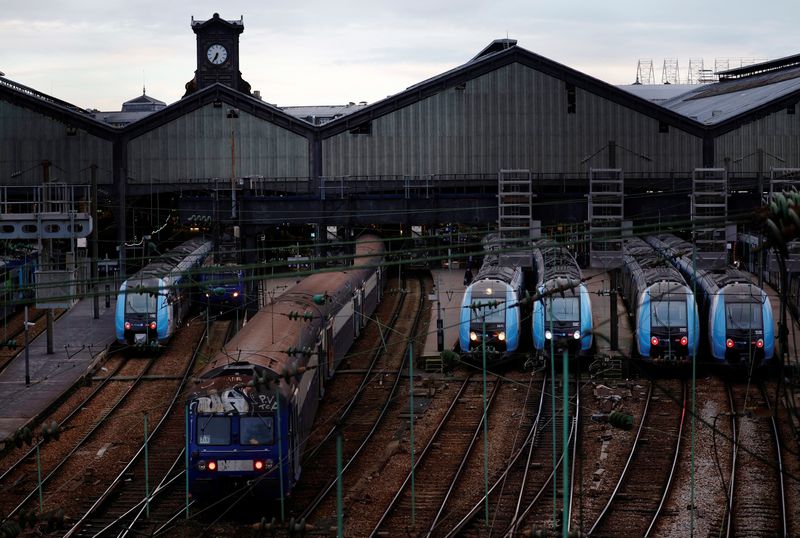By Antony Paone and Benoit Tessier
PARIS (Reuters) -More than a million people marched through French cities on Thursday to denounce President Emmanuel Macron's plans to raise the retirement age, with a wave of nationwide strikes halting trains, blocking refineries and curbing power generation.
Buoyed by their success, the country's leading trade unions called for a second day of strikes on Jan. 31 in a bid to force Macron and his government to back down on a pension reform plan that would see most people work an extra two years to age 64.
"Now, the government finds itself with its back to the wall," the unions said in a joint statement. "Everyone knows that raising the retirement age only benefits employers and the wealthy."
The protests are a major test for Macron, who said on Thursday that his pension overhaul was "just and responsible", and necessary to help keep government finances on a sound footing. Opinion polls show most French oppose the measure.
Some 1.1 million protesters took to the streets in scores of protests across France, the Interior Ministry said, more than during a first wave of street protests when Macron first tried to pass the reform in 2019. He shelved that attempt when the COVID pandemic erupted.
Police fired tear gas during intermittent skirmishes with hooded youths on the fringe of the Paris rally. Several dozen arrests were made.
"It's salaries and pensions that must be increased, not the retirement age," read one large banner carried by workers in Tours, western France.
"I'll have to prepare my walking frame if the reform goes through," said Isabelle, 53, a social worker, saying her job was too tough to add two more years.
The government says the pension reform is vital to ensure the system does not go bust. Pushing back the retirement age by two years and extending the pay-in period would bring an additional 17.7 billion euros ($19.1 billion) in annual pension contributions, allowing the system to break even by 2027, according to Labour Ministry estimates.
Unions argue there are other ways to finance pensions, such as taxing the super-rich or increasing employers' contributions or those of well-off pensioners.
"This problem can be solved in a different way, through taxation. Workers should not have to pay for the public sector deficit," said Laurent Berger, the leader of CFDT, France's biggest labour union.
SOCIAL DISCONTENT
The challenge for the unions is to transform opposition to the reform - and anger over a cost-of-living crisis - into a mass social protest which could eventually force the government to change tack.
Union leaders said Thursday was just the beginning.
The pension reform still needs to go through parliament, where Macron has lost his absolute majority but is hoping to get it passed with the support of conservatives.
"Let's continue to debate and convince," Prime Minister Elisabeth Borne wrote on Twitter.
Train drivers, teachers and refinery workers were among those who walked off their jobs, as well as half the workforce at state-run nuclear power producer EDF (EPA:EDF).
High speed intercity and local Paris commuter train services were severely disrupted, the SNCF rail operator said.
DISRUPTION
In the busy Gare du Nord station, people rushed to catch the few trains still operating while employees in yellow vests were assisting frazzled commuters.
Restaurant worker Beverly Gahinet, who missed work because her train was cancelled, said she agreed with the strike even if she was not taking part.
But not all were so understanding.
"It's always the same (people) who are on strike ... and we have to endure it," said real estate worker Virginie Pinto, as she struggled to find a metro to go to work.
Some union members have talked of recreating the spirit of 1995, when Jacques Chirac's government requisitioned tourist boats on the river Seine to ferry commuters to work and backed off a pension overhaul after weeks of transport strikes.
But the ability of unions to bring chunks of the euro zone's second-biggest economy to a halt and force governments into a reversal is not what it used to be.
A 2007 ban on wildcat walkouts and a requirement on strikers to guarantee minimum public services have limited unions' ability to wear down governments' reform ambitions. Home-working and other changes in working practices may also blunt their impact.
Even so, the strike halted ferry crossings between Dover (NYSE:DOV) and Calais, a major sea route for trade between Britain and the continent.
EDF and grid operator RTE data showed electricity production was down by roughly 10% of total power supply, prompting France to raise imports.
Shipments were blocked at TotalEnergies' refineries in France, union and company officials said, but the company said one strike day would not disrupt refinery operations.
